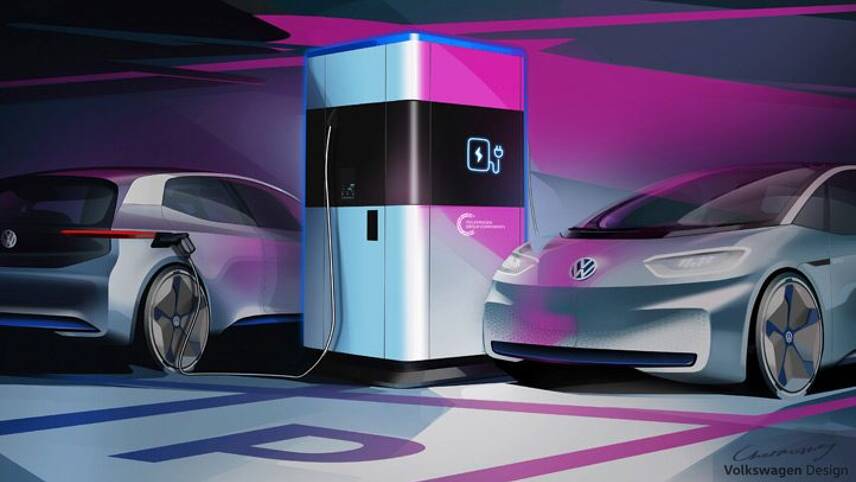Register for free and continue reading
Join our growing army of changemakers and get unlimited access to our premium content

VW will trial the first mobile station in the first half of 2019 at its home city of Wolfsburg in Germany
The mobile charging station is designed to be set up in public car parks, on company premises and in areas used for large-scale events without any structural changes of “major financial outlay”. VW showcased the innovation during the Christmas period.
According to VW, the station works like a power bank would for smartphones and has a charging capacity of up to 360kWh, meaning that up to 15 EVs can be charged, and four charged at the same time.
VW Group Components’ chair of the board of management Thomas Schmall said: “The mobile charging stations are a decisive step toward an efficient network of charging points. They can be set up anywhere as required – with or without connection to the power supply. This flexibility enables a completely new approach to the rapid expansion of the charging infrastructure.
“Cities can, for example, find out the most suitable places for a permanent charging point before making major investments in developing the network. In addition, it will be possible to set up a large number of charging stations temporarily – exactly when and where they are needed.”
According to the manufacturer, charge times average at just 17 minutes. If the station is attached to a power supply, the battery pack is able to recharge itself. If it is used for temporary or isolated purposes, the charging station will be replaced once the installed battery’s energy content falls below 20%.
The mobile charging station is designed to create a second life for VW’s Modular Electric Toolkit (MEB) battery pack, on which all of VW’s planned EVs are based. It can also connect to renewable power supplies, offering zero-emission mobility for users.
Trials ahead
VW will trial the first mobile station in the first half of 2019 at its home city of Wolfsburg in Germany. By 2020, it is envisioned that the stations will roll out to other cities and communities.
“Our mobile charging stations offer a further crucial advantage,” VW Group Components’ head of technical development Mark Möller added. “It is only when an electric car is charged with sustainably generated power that it can claim CO2-neutral mobility. Our charging station is the first to offer the possibility of temporarily storing sustainably generated power.”
The carmaker notes that quick and accessible charging infrastructure is essential in spurring the uptake of its EV portfolio. Numerous large-scale projects are underway to improve charging infrastructure, notably in the UK.
Last year, it was announced that the world’s first 2GW network of grid-scale batteries and rapid EV charging stations is set to be installed in the UK at a cost of £1.6bn. However, research suggests that an additional 25,000 charging points are required on the streets of Britain to meet the EV charging needs of 2030.
This week, Ovo Energy installed what it claims is the “world’s first” widely available, domestic vehicle-to-grid (V2G) charger at a customer’s home. The 6KW device connects with EVs and enables them to transfer electricity back to the grid to supply it with electricity at peak demand.
Matt Mace



Please login or Register to leave a comment.